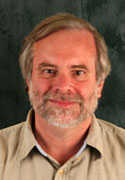Beckman Institute researchers Jennifer Cole and Mark Nelson have been named as the new co-chairs of the Biological Intelligence (BioIntel) research theme.
Cole, a member of Beckman’s Cognitive Science group, is Associate Professor in the Department of Linguistics at the University of Illinois and a faculty affiliate in the Department of Computer Science. She replaces Monica Fabiani in the role.
Nelson is a Professor in the Department of Molecular and Integrative Physiology at the University of Illinois and a full-time faculty member in the NeuroTech group at Beckman. He replaces Bill Greenough as a co-chair.
“I want to thank all of these faculty members for their commitments in helping the Beckman Institute continue to achieve its research mission,” said Beckman Institute Director Art Kramer.
Kramer praised Fabiani’s service as Co-chair of the BioIntel research theme and thanked Cole for agreeing to take over.
“Monica’s contributions as a co-chair went well above what the position required,” Kramer said. “She oversaw an increase in the development of new research programs in the BI MRT, new sources of external funding, and an external committee review for this research theme, providing the kind of leadership from faculty that is critical to the success of the Beckman Institute.”
Kramer said Cole is well-suited to serve as a co-chair of this research theme.
“Jennifer is an ideal choice to serve as the new Co-chair of Biological Intelligence,” he said. “Her many successful interdisciplinary collaborations involving psychologists, other linguists, and engineers have shown she has the broad knowledge required to lead this evolving research theme."
In addition to her appointments at Beckman and Linguistics, Cole is an affiliate with the Department of Computer Science. Her research focuses on spoken language and includes phonology, phonetics, human speech processing, and computational linguistics.
Cole said she is excited about the future of Biological Intelligence at Beckman, in part because of the cutting-edge experimental methods and new technologies for imaging and tracking psychophysiological processes researchers that are being developed within this research theme.
“BioIntel researchers have made exciting advances in understanding the basis of intelligent behavior in terms of neural and cognitive systems,” Cole said. “An exciting challenge lies ahead in applying the scientific findings we gain from our laboratory research to biological intelligence manifest on a larger scale outside the laboratory, such as in the behaviors among individuals that shape and define communities, or on a longer timescale, such as in the evolution of systems supporting intelligent behavior in humans and animals.
“Such pursuits will provide opportunities for BioIntel researchers to cooperate with experts in computer science, electrical and computer engineering, and bioengineering to develop new research paradigms and supporting technologies. New research initiatives that span MRTs can strengthen and enhance the ongoing research in BioIntel, fulfilling the core mission of the Institute in bridging traditional barriers between scientific and technological disciplines.”
Greenough was a founding father of the Beckman Institute, serving as chair of one of two committees formed in 1983 to explore the creation of a multidisciplinary research center on campus. Kramer said Greenough’s contributions to Beckman and Illinois have been invaluable.
“Bill Greenough was instrumental in the Beckman Institute coming into being and has probably contributed more to its success over the past 20-plus years than any other faculty member at the university,” Kramer said. “His time as Co-chair of Biological Intelligence has been an essential asset during this research theme’s development and led directly to its world-class leadership role in this area. We thank him for his incalculable contributions to the Beckman Institute and the University of Illinois.”
Kramer said Nelson’s background includes many of the areas that are on the leading edge of research in biological intelligence.
“Mark Nelson’s research encompasses many of the leading topics and current approaches in biological intelligence such as computational neuroscience, biomimetics, physiology, and neuroengineering,” Kramer said. “He brings a unique perspective built on broad experience to this position. We thank Mark for taking this position at a crucial time in the history of our Institute.”
In addition to faculty appointments at Beckman and his home department, Nelson is also a member of the Neuroscience program, the Biophysics and Computational Biology program, and the Bioengineering program at the University of Illinois. His fields of professional interest are computational neuroscience, neural coding, and biological signal processing.
Nelson said he hopes that in the future the Biological Intelligence theme will continue to foster innovative research that cuts across disciplinary boundaries.
“This will include analyzing brain function across multiple levels of neurobiological organization – the so-called molecules-to-mind continuum – as well as understanding dynamic interactions between brain, body and environment in real-world scenarios,” Nelson said. “BioIntel researchers will play a key role in efforts to promote successful aging, as outlined in the developing initiative on Healthy Bodies, Brains, Minds and Communities.
“In the coming years, I think we will also see a steady increase in applications-related BioIntel research focused on developing the next generation of brain-related biomedical technologies, as highlighted, for example, by the new Neuroengineering IGERT program.”

